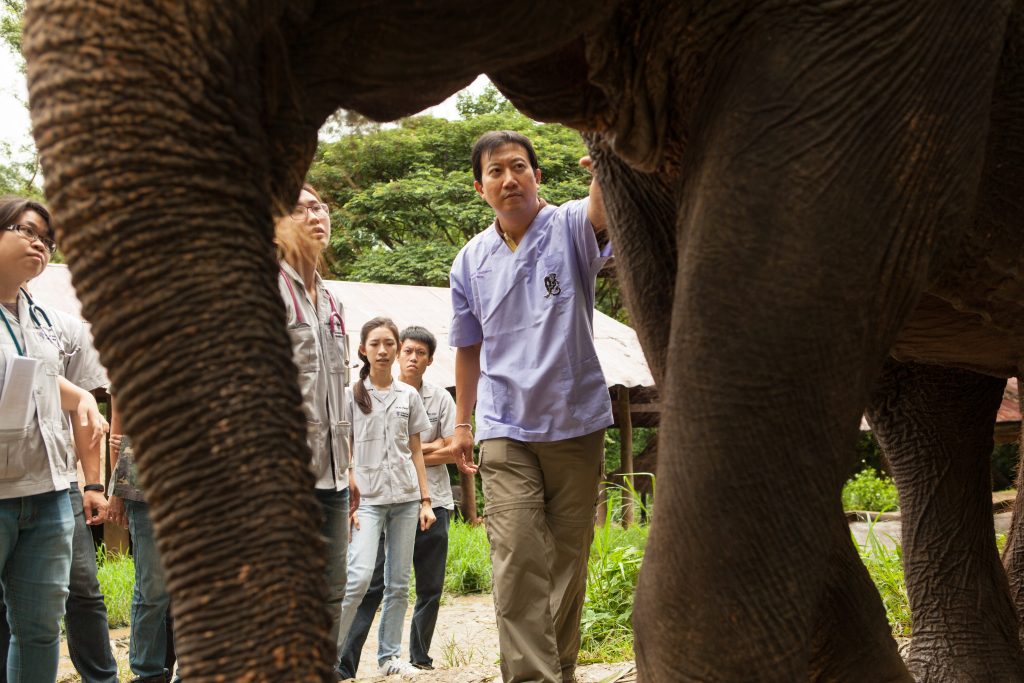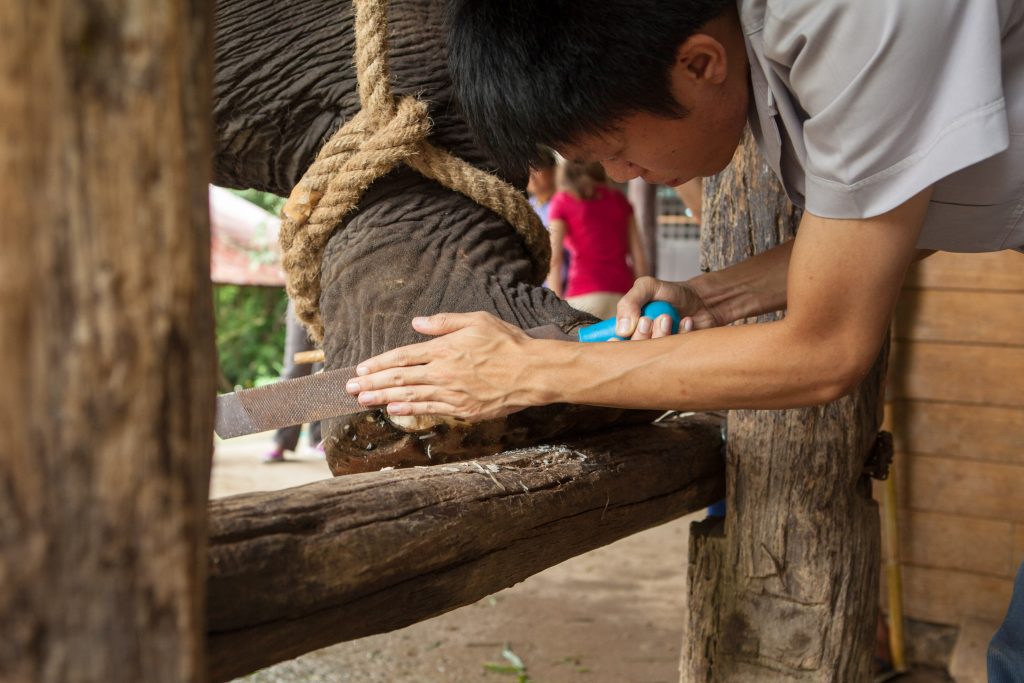We in Thailand have long taken elephants for granted. They have always just been ‘there’, taking our kings into battle through history, sung about in nursery rhymes, seen begging on the streets and as a tourist magnet. Elephants have lived amongst us and with us for so many generations that today’s trend to ‘free’ elephants, calling for a return to the wild, can be quite bewildering to we Thais.
Just over a century ago Thailand was home to over 100,000 wild elephant, today that number has dwindled to around 3,000. However, thousands more live in captivity alongside man in elephant camps and sanctuaries. This is cause for much debate amongst experts and profiteers, animal rights groups and owners.
CityNews talks to Carmen Rademaker, Founder of Naka Foundation, based in Chiang Mai, which works towards the conservation and wellbeing of elephants.

Dr. Chatchote Thitaram, Director of the Center of Excellence in Elephant Research and Education, Chiang Mai University teaching his students at one of the elephant camps here in the north.
Photo credit: Cody Cutter
CityNews: How did you get involved with elephant conservation?
Rademaker: I have been in Chiang Mai for 16 years, so I have always been aware of, and interested in, elephant issues. I began to work with the Elephant Parade a few years back, running their foundation. But because of the global nature of their business, and political nature of elephant wellbeing and conservation, Elephant Parade soon realised that they would rather work with outside foundations, so they are now donating some of their proceeds towards foundation such as Friends for Asian Elephant. I wanted to continue my work with elephants, so I founded Naka, I am fortunate that Elephant Parade has also chosen our foundation to support.
CityNews: What does Naka do?
Rademaker: By working with so many experts here, my focus was soon on captive elephants. I realised that there are so many foundations which help wild elephants, but very few working towards the wellbeing of captive ones. We work to improve their welfare, finding solutions for the fact that they’re in captivity and there is little hope to ever get them back to the wild, so we work on pragmatic issues. This may not be popular, but the fact is that tourism is a good solution; but the question is then how to make it sustainable and with the best welfare not only for the elephants, but for the communities and mahouts which live among them.
CityNews: Are there standards for captive elephants?
Rademaker: There are no laws now in Thailand. Elephants are under the Beast of Burden Act, which has been in use since 1939. Anyone can own an elephant and do with it anything they want. They’re not protected; they are the same as pigs and cows. There are also no rules and standards for management of camps and sanctuaries. This is something that I am very passionate about. To look into this situation and find a set of approved standards, if not legally, then at least make it interesting enough for all camp owners to follow.
Dr. Preecha Phoungkam from Friends of the Asian Elephant, giving treatment to an elephant in one of the camps in Mae Tang valley.
Photo credit: Jordan Trigilio
CityNews: What kind of standards would you put in place?
Rademaker: i.e. Standards for times that elephants work. I would say four hours a day maximum. Every camp now is different, some work them for 8-12 hours, especially in touristy areas like Phuket. Mahouts get very little payments and are offered commissions based on the number of tourists, so they work their elephants harder. Good diet and access to water is also crucial. Elephants in their natural habitat eat for up to 18 hours a day, so if they are working for eight hours, when are they eating? Some businesses also allow tourists to feed elephants, and with that too much of their diet consists of fruits. This is like giving a child only candy; where’s the fibre? Obesity in elephants is not good for their health in the long term. They should have rules that tourists can only feed elephants greens; fruits should only be for special treats. Elephants also need a lot of time to roam free, even if it’s on a long chain, they should have alone time. Like us, elephants get stressed and they need their own time, time to rest, but also time to socialise with their own kind.
CityNews: How are you going about doing this?
Rademaker: As founder of Naka, I am secretary of the ASEAN Captive Elephants Working Group, a group of elephant experts – biologists, conservationists, vets – from all over the world, though mainly from South East Asia. My role is to organise meetings, fundraising and communications. You will find that people with far less expertise, but with media savvy, are now controlling the narrative. We need to give these experts a voice. I want NAKA to help represent local Thai groups in furthering an agenda of improved welfare for captive elephants.
Our web site will be publishing research papers, uploading a list of FAQs and answering any pertinent questions.
CityNews: What kind of information is getting out there that maybe misleading?
Rademaker: More and more people, especially in the west, seem to think that elephants need to roam wild. True, but the reality is that this is not possible. Semi-sanctuaries are not necessarily the solution either, as they do not take in family herds and lack control of elephants which endangers the lives of not only the elephants but the tourists and mahouts who interact with them. You can’t just dump a bunch of elephants together and expect them to get along, it doesn’t work that way. Even keeping elephants in large fenced in areas without people is also not always a good idea. In my opinion, captive elephants need to be managed on a case by case basis with the input of experts who know elephant behaviour, especially if you are going to integrate groups.

Caring for the wellbeing of elephants
CityNews: What steps are you taking to better the lives of captive elephants?
Rademaker: Chiang Mai University Faculty of Veterinary Medicine’s Centre of Excellence in Elephant Research and Education is currently working with the National Elephant Institute in Lampang to research all camps. Based on those findings, and on science, a list of standards will be published. We are working on that now. We are working with many tour operators, talking to the media and getting the word out there. There are messages going out by certain groups, pandering to what people want to hear, it is all about fundraising. We will only give out truthful, science based, information. People are good, they want to do good and it is easy to manipulate their emotions. We hope that people will understand that it is more useful to support a humane elephant camp with high standards in riding elephants than somewhere with no standard or accountability that simply posts a picture of a tortured baby elephant.
Mahouts are key persons to elephant welfare and they have had a long historic relationship with elephants. It used to be a noble career. We need to stop vilifying them and offer them secure employment with all the benefits other jobs enjoy. We want to find ways to provide training to them as there are few real mahouts left . These days we also have new knowledge on animal behaviour and training, which if introduced appropriately can replace some of the traditional methods. A good mahout doesn’t just know how to deal with elephants, they earn their respect, and it is a strong bond.
Primary health care is another issue. There are very few vets who work with elephants as it is a dangerous job which is underpaid. We want these jobs to be honourable and raise their standards so that our elephants are cared for in the most professional and compassionate way.
We want to make sure that we enjoy a mutually healthy and happy relationship with elephants.
Facebook:https://www.facebook.com/NAKA-Elephant-Foundation-681804261962491/?fref=nf